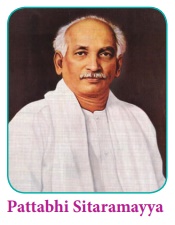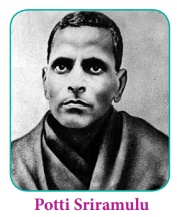Reconstruction of Post-colonial India | History - Linguistic Reorganization of States | 12th History : Chapter 8 : Reconstruction of Post-colonial India
Chapter: 12th History : Chapter 8 : Reconstruction of Post-colonial India
Linguistic Reorganization of States
Linguistic Reorganization of States
An
important aspect of the making of independent India was the reorganisation of
states on linguistic basis. The colonial rulers had rendered the sub-continent
into administrative units, dividing the land by way of Presidencies or
Provinces without taking into account the language and its impact on culture on
a region. Independence and the idea of a constitutional democracy meant that
the people were sovereign and that India was a multi-cultural nation where
federal principles were to be adopted in a holistic sense and not just as an
administrative strategy.
The
linguistic reorganization of states was raised and argued out in Constituent
Assembly between 1947 and 1949. The assembly however decided to hold it in
abeyance for a while. This was on the grounds that the task was huge and could
create problems in the aftermath of the partition and the accompanying
violence.
After the
Constitution came into force it began to be implemented in stages, beginning
with the formation of a composite Andhra Pradesh in 1956. It culminated in the
trifurcation of Punjab to constitute a Punjabi-speaking state of Punjab and
carving out Haryana and Himachal Pradesh from the existing state of Punjab in
1966.
The idea
of linguistic reorganisation of states was integral to the national movement,
at least since 1920. The Indian National Congress, at its Nagpur session
(1920), recorded that the national identity will have to be necessarily
achieved through linguistic identity and resolved to set up the Provincial
Congress Committees on a linguistic basis. It took concrete expression in the
Nehru Committee Report of 1928. Section 86 of the Nehru Report read: “The
redistribution of provinces should take place on a linguistic basis on the
demand of the majority of the population of the area concerned, subject to
financial and administrative considerations.”
This idea
was expressed, in categorical terms, in the manifesto of the Indian National
Congress for the elections to the Central and Provincial Legislative Assemblies
in 1945. The manifesto made a clear reference to the reorganisation of the
provinces: “… it (the Congress) has also stood for the freedom of each group
and territorial area within the nation to develop its own life and culture
within the larger framework, and it has stated that for this purpose such
territorial areas or provinces should be constituted as far as possible, on a
linguistic and cultural basis…”
On August
31, 1946, only a month after the elections to the Constituent Assembly,
Pattabhi Sitaramayya raised the demand for an Andhra Province: “The whole
problem” he wrote, “must be taken up as the first and foremost problem to be
solved by the Constituent Assembly”. He also presided over a conference, on
December 8, 1946, that passed a resolution demanding that the Constituent
Assembly accept the principle for linguistic reorganisation of States. The
Government of India in a communique stated that Andhra could be mentioned as a
separate unit in the new Constitution as was done in case of the Sind and
Orissa under the Government of India Act, 1935.
The
Drafting Committee of the Constituent Assembly, however, found such a mention
of Andhra was not possible until the geographical schedule of the province was
outlined. Hence, on June 17, 1948, Chairman Rajendra Prasad set up a 3-member
commission, called The Linguistic Provinces Commission with a specific brief to
examine and report on the formation of new provinces of Andhra, Kerala,
Karnataka and Maharashtra. Its report, submitted on December 10, 1948, listed
out reasons against the idea of linguistic reorganisation in the given context.
It dealt with each of the four proposed States – Andhra, Karnataka, Kerala and
Maharashtra – and concluded against such an idea.
However,
the demand for linguistic reorganisation of states did not stop. The issue
gained centre-stage with Pattabhi Sitaramayya’s election as the Congress
President at the Jaipur session. A resolution there led to the constitution of
a committee with Sardar Vallabhai Patel, Pattabhi Sitaramayya and Jawaharlal
Nehru (also called the JVP committee).

The JVP
committee submitted its report on April 1, 1949. It too held that the demand
for linguistic states, in the given context, as “narrow provincialism’’ and
that it could become a menace’’ to the development of the country. The JVP
committee also held out that “while language is a binding force, it is also a
separating one’’. However, it stressed that it was possible that “when
conditions are more static and the state of peoples’ minds calmer, the
adjustment of these boundaries or the creation of new provinces can be
undertaken with relative ease and with advantage to all concerned.’’

The
committee said in conclusion that it was not the right time to embark upon the
idea of linguistic reorganisation of States. In other words, the consensus was
that the linguistic reorganisation of states be postponed. There was provision
for re-working the boundaries between states and also for the formation of new
states from parts of existing states. The makers of the Constitution did not
qualify the reorganisation of the States as only on linguistic basis but left
it open as long as there was agreement on such reorganisation.
The idea of linguistic states revived soon after the first general elections were over. Potti Sriramulu’s fast demanding a separate state of Andhra, beginning October 19, 1952 and his death thereafter on December 15, 1952.
Article 3, reads as
follows:
Parliament may by law- (a) form a new State by separation of
territory from any State or by uniting two of more States or parts of States by
uniting any territory to a part of any State; (b) increase the area of any
State; (c) diminish the area of any State; (d) alter the boundaries of any
State;
This led
to the constitution of the States Reorganisation Commission, with Fazli Ali as
Chairperson, and K.M. Panikkar and H.N. Kunzru as members. The Commission
submitted its report in October 1955. The Commission recommended the following
States to constitute the Indian Union: Madras, Kerala, Karnataka, Hyderabad,
Andhra, Bombay, Vidharbha, Madhya Pradesh, Rajasthan, Punjab, Uttar Pradesh,
Bihar, West Bengal, Assam, Orissa and Jammu & Kashmir. In other words, the
Commission’s recommendations were a compromise between administrative
convenience and linguistic concerns.
The Nehru
regime, however, was, by then, committed to the principle of linguistic reorganization
of the States and thus went ahead implementing the States Reorganisation Act,
1956. Andhra Pradesh, including the Hyderabad State came into existence.
Kerala, including the Travancore-Cochin State and the Malabar district of
Madras, came into existence. Karnataka came into being including the Mysore
State and also parts of Bombay and Madras States. In all these cases, the core
principle was linguistic identity.
In May
1960 Gujarat was created from Maharastra to fulfil the demand of the Gujarati
speaking people. Subsequently, the demand for a Punjabi subha continued to be
described by the establishment as separatist until 1966. The trifurcation of
Punjab, brought to an end the process that was initiated by the Indian National
Congress, in 1920, to put language as the basis for the reorganization of the
provinces.
Related Topics